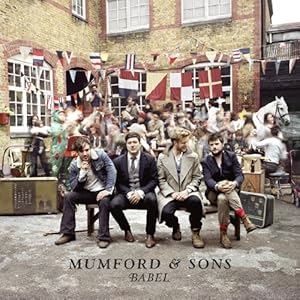 Two albums in, and Mumford & Sons are already the anti-hip. I mean, it’s one thing to cut your pop songwriting with nominally-unconventional-but-not-really instrumentation in an approximation of an “older” style of music (in this case, folk); it’s another entirely to bear all the earmarks of an indie band while extracting a lot of the unpleasant stereotypes people have about independent music (lack of discernible melody, heavy reliance on detached irony). Easy, accessible melodies and simple, straightforward pop poetry? The balls on these guys.
Two albums in, and Mumford & Sons are already the anti-hip. I mean, it’s one thing to cut your pop songwriting with nominally-unconventional-but-not-really instrumentation in an approximation of an “older” style of music (in this case, folk); it’s another entirely to bear all the earmarks of an indie band while extracting a lot of the unpleasant stereotypes people have about independent music (lack of discernible melody, heavy reliance on detached irony). Easy, accessible melodies and simple, straightforward pop poetry? The balls on these guys.
The fact remains, to far too many modern music fans, it’s simply not cool to be heartfelt or earnest. Picture a heartfelt, earnest band for a second — is it anyone that your one friend with the totally cutting-edge music taste actually respects? Perhaps you pictured U2, or the Counting Crows, or the Goo Goo Dolls or any number of bands with a boatload of digestible hooks and unironic, lovelorn lyrics to their name; find some sort of borderline snobby music website and comb through some comment sections. See if the judgmental and opinionated armchair music critics of this world have anything nice to say about any of them. “Ugh, that Bono, always going on about his heart and caring about AIDS like his shit don’t stink. What a turd.”
And so here comes Mumford & Sons to remind you that you haven’t played Sigh No More since June 2011, and have helpfully furnished you with an inoffensive sequel that touches upon all the same well-worn plot points. Babel is a decidedly unsurprising record. The Mumfords have looked upon the house that Sigh No More built, and decided, as per the old cliche, not to fix it. It’s a perfectly viable approach on their part — their sound is certainly nothing new, but their success has ushered in a full-on folk-rock fad, radio stations rushing to spin The Avett Brothers, Of Monsters And Men, The Lumineers, and Edward Sharpe & the Magnetic Zeroes, even American Idol gleefully cashing in with a full-on Mumford-lite champion last season. And early in their career, Mumford & Sons have nothing to lose by sticking with the style that made them household names.
So, really, how you gauge the artistic success of Babel depends entirely on what you felt about Sigh No More. Did Sigh out Mumford & Sons as the Nickelback of their genre, a band that explodes by exploiting a subgenre and cleaning it up to peddle it to the masses? Or was it a breath of fresh air in the pop landscape, an boldly sentimental and refreshingly simple conceit that harkened back to a less jaded era of pop songcraft? Whichever of these ideas embodies Sigh No More to you, Babel is that. Babel is exactly that.
Not that this is necessarily a bad thing. I mean, if Beyonce’s “Crazy In Love” was simply played too much for you, and you recognize it as a good song while simultaneously lamenting its over-saturation, the solution isn’t for Beyonce to revert to Appalachian folk or ’80s speed-metal for her next record; you simply wait for her to write a new up-tempo love song, find a new horn sample, and snag a new Jay-Z verse. And sell it to you as “Deja Vu”. Such is Mumford & Sons; it’s easy to get caught up in their whirlwind of deliriously catchy melodies, but it’s also easy to hear “Little Lion Man” and “The Cave” too many times. Hence, Babel, a new set of tunes in the same etched-in-stone format.
And at that format, they excel with flying colors. Like a folk-rock Nirvana, the Mumfords get a lot of mileage out of their soft/loud dynamic, lead singer Marcus Mumford’s plaintive one-liners exploding into a bombastic acoustic guitar and banjo riff on the title track, several songs careening from the “Little Lion Man” muted strumming pattern (you know the one) into a full-bore four-on-the-floor hoedown. Which also can cause the listener to get lost deep in the tracklist, unsure of what song they’re on (musical diversity isn’t necessarily this band’s strong suit, and that’s okay); lead single “I Will Wait” even Xeroxes most of “Lion Man”, albeit to stellar affect — it’s a melodic, heartfelt outing, and the swelling horns really drive it home.
If all this sounds like damning with faint praise, that’s not the intention. If there’s one thing Babel is not, it’s bland; if the Mumfords are formulaic, it’s an agreeable formula, irony-free, catchy, swaying, earnest. It’s music that aims directly for the heart, and succeeds; after all, the heart (and the occasional opaque Biblical reference) is Marcus Mumford’s favorite lyrical topic. So go ahead, call it folk-rock for soccer moms or frat boys. It’s fine; those of us who recognize Mumford & Sons as a terrific pop band with a sackful of hooks and heart to spare will sing along full-throated to “Holland Road” and “Hopeless Wanderer”. Hey, they didn’t think Billy Joel was cool, either.
Grade: B

